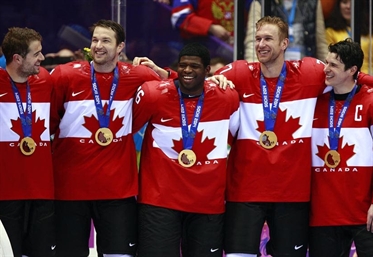The Players
The Players
Report cards for Canada’s gold medallists

 Canada's Marc-Edouard Vlasic, Rick Nash, P.K. Subban, Jeff Carter and Sidney Crosby are all smiles after a 3-0 gold medal win over Sweden. Photo: Jeff Vinnick / HHOF-IIHF Images
Canada's Marc-Edouard Vlasic, Rick Nash, P.K. Subban, Jeff Carter and Sidney Crosby are all smiles after a 3-0 gold medal win over Sweden. Photo: Jeff Vinnick / HHOF-IIHF Images
Consider that there have been 13 such tournaments – 1972 Summit Series; 1976, 1981, 1984, 1987, 1991 Canada Cup; 1996 and 2004 World Cup; 1998, 2002, 2006, 2010, 2014 Olympics – and Canada has won nine of those events. It has appeared in the finals in 11. Only in Nagano 1998 and Turin 2006 did Canada fail to reach the gold medal game.
And the four times Canada didn’t win, no nation won even two. The Soviets won the 1981 Canada Cup; the Americans the 1996 World Cup; the Czechs the 1998 Olympics; and the Swedes the 2006 Olympics.
Along the way, Canada has faced multiple opponents – the United States four times, the Soviets three, Czechoslovaks once, Swedes twice, Finns once. No team has been dominant or as successful as Canada – not even close.
In Sochi, Canada was in a class by itself. Consider that the team never trailed for even one second of play over the course of six games. It allowed three goals in the tournament to go with three shutouts, finishing with a streak of 164:19. Canada led in face-offs, and six players had a faceoff percentage of 56 or higher.
There were no players under +1 in the plus/minus rating except P.K. Subban, who was an even 0. Two of the three top scoring defencemen were Canadian (Drew Doughty and Shea Weber). Canada surrendered only one power-play goal against.
Perhaps most incredibly, more than half the players were not on the ice for a single goal against the entire tournament.
Here is a look back at how the players fared in Sochi.
Continue readingGoalkeepers
Carey Price: Irony personified. Ever since Steve Yzerman was re-hired as general manager for the team some two years ago, critics and fans alike spoke of Canada’s greatest strength being the firepower of the forwards and the greatest weakness its goaltending. Yet Canada allowed only three goals in six games thanks largely to Price’s phenomenally steady performance.
Roberto Luongo: He got a shutout in his one game, but shaky play from Vancouver in 2010 ensured the coaching staff wasn’t going to use him in playoff elimination games unless forced to. Classy all the way, he accepted the backup role without making a fuss and earned a second Olympic gold medal.
Mike Smith: The third goalie dressed as backup for only one game, but his late and meteoric rise in the NHL earned him a spot on the team, a huge accomplishment in and of itself.
Defencemen
Duncan Keith: A workhorse who logged serious minutes and was simply reliable beyond words. He led all players in average ice time, but was not on the ice for even one goal against.
Jay Bouwmeester: One of the older players on the team with the longest Hockey Canada experience. He played his first event in 2000 at the U20 and first senior event at the 2003 World Championships. Not flashy, but very effective.
Drew Doughty: As a 20-year-old in Vancouver, he started off as the sixth or seventh defenceman, but he was so impressive. He was the most relied on by the time the gold-medal game came around. This time, in Sochi, he was nothing short of extraordinary.
Shea Weber: No player in any league in any country on this planet shoots the puck like Weber. The rubber leaves his stick with a trajectory and speed that is terrifying. As Babcock even said, in the NHL he never uses his top penalty killers against Weber for fear of injury.
Marc-Edouard Vlasic: He didn’t get the minutes of the big three (Weber, Doughty, Keith), but his inclusion on the team is no surprise. Smart and steady, he always made the safe and sure play.
Dan Hamhuis: The seventh defenceman, Hamhuis saw little action, but the ever-classy Babcock gave him a couple of shifts in the third period of the gold-medal game.
P.K. Subban: Subban got into only one game but was thrilled with the opportunity afforded him and handled his role with class. He will no doubt be a better defenceman for his experience.
Forwards
Sidney Crosby: The captain and leader was the best player on the ice the last two games when it mattered most and scored one of the nicest goals of the tournament in the second period against Sweden. He also was not on the ice for even one goal against.
Jonathan Toews: Arguably the best all-around player in the world. Unbelievable ability in the big games and flawless in every aspect. He opened the scoring in the gold-medal game in Vancouver at 12:50 of the first period, and he opened the scoring against Sweden in Sochi at 12:55 of the first.
Patrice Bergeron: Winning follows Bergeron like a shadow on a sunny day. He played alongside Crosby at the 2005 U20, the 2006 World Championship, and again in Sochi, winning gold every time.
Chris Kunitz: Perhaps the most controversial player selection because many felt he was included only because he was Crosby’s wingman in Pittsburgh (and why is that bad?), Kunitz scored the final goal of the 2014 Olympics and worked well on the line with Crosby and Bergeron. Not outstanding, but a solid performance all the same.
Patrick Sharp: He fought for ice time and earned it as the tournament progressed thanks to superb play.
Patrick Marleau: Back for a second gold after Vancouver, Marleau is offensively gifted and defensively responsible. Great skater and passer, superb hands around the net, and at 34 years of age probably just competed in his last Olympics.
Jeff Carter: The only forward to have as many as three goals (and all in the same game), Carter was dominant. A big man with great footspeed, he created havoc and took away time from the opposition every time he was on the ice.
Ryan Getzlaf: Playing on a line with Jamie Benn and Anaheim Ducks teammate Corey Perry, Getzlaf controlled his emotions and played a disciplined game in the name of the team.
Rick Nash: Dedicated to the team, Nash embraced his role as a fourth-line player who logged important minutes. His third Olympics, he also had played in four World Championships, winning two gold and a silver. Few players have been as enthusiastic about international play as Nash.
Corey Perry: Professional personified, Perry did it all with near perfection, an essential member of the team and core of the back-to-back Olympic victories. He and Getzlaf intuitively know each other on ice like the Sedin twins.
Martin St-Louis: At 38 the oldest player on the team, St-Louis was proud to play when he got the chance, even though he sat on the end of the bench for one game without getting a shift. By the gold-medal game, Babcock needed him for energy, and he played a mostly regular shift, creating several scoring chances along the way.
Matt Duchene: He played in the 2010, 2011, and 2013 World Championship as a tryout of sorts for Sochi. Only 23 years old, he will be a star on the team in PyeongChang if the NHL participates.
John Tavares: Another loyal member of Hockey Canada who played in three of the last four World Championships, Tavares had his Olympic experience cut short by a knee injury against Latvia. Still only 23, he will be in PyeongChang, no doubt about it.
Back to Overview











































